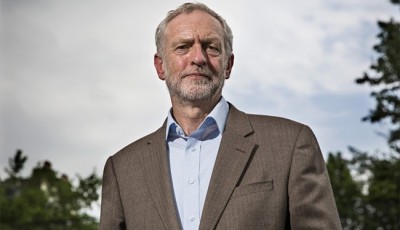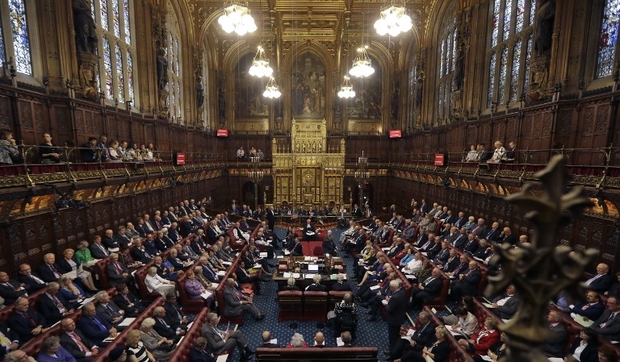How Britain’s “Party of War” Gave the Green Light to the Saudi Attack on Yemen

This week’s Yemen vote demonstrates something apparent since the vote to invade Iraq: the party of war holds a majority in the Commons
Last month, Jeremy Corbyn was re-elected as Labour leader. It was his second victory by an overwhelming majority in a year, and it should have given Corbyn uncontested authority.
Yet he is still regarded with mutinous contempt by a significant proportion of his own side. They flatly refuse to accept Corbyn’s leadership.
I have reported politics from Westminster for almost 25 years and can recall few more shocking parliamentary events
This became clear on Wednesday night, when more than 100 Labour MPs failed to support a three-line whip on British policy towards the Yemen. It was disloyalty on an epic scale.
Corbyn cannot be faulted for calling a debate on Yemen. For the past 18 months, Britain has been complicit with mass murder as our Saudi allies have bombarded Yemen from the air, slaughtering thousands of innocent people as well as helping fuel a humanitarian calamity.
Corbyn clearly felt that it was his duty as leader of a responsible and moral opposition to challenge this policy. He nevertheless bent over backwards to make sure that the Yemen vote was uncontroversial. The Labour motion therefore stopped short of calling for the suspension of arms sales to Saudi Arabia which has been demanded by many charities and campaign groups.
This is because Corbyn and his foreign affairs spokeswoman Emily Thornberry were mindful that some Labour MPs represented constituencies where local jobs depended on the arms industry. So they contented themselves with demanding an independent United Nations inquiry into crimes committed by all sides – not just the Saudis – in this terrible and bloody conflict. They reasonably suggested that Britain should suspend support for the Saudis until this investigation was completed.
Green light to Saudi
This is the position taken by the bulk of the international community, by all reputable aid agencies and, as far as I can tell, by almost all ordinary Yemenis. In her excellent speech on Wednesday afternoon, Thornberry set out the reasons why the Saudis could no longer be trusted to investigate their own affairs.
But for Labour abstainers and absentees, Corbyn’s motion would have been carried and parliament would have voted for an independent investigation
Yet more than 100 Labour MPs – not far short of half the Labour Party – defied Corbyn. As a result, Labour’s call for an independent inquiry was defeated by 283 votes to just 193, a majority of 90. But for Labour abstainers and absentees, Corbyn’s motion would have been carried and parliament would have voted for an independent investigation.
The vote is bound to be interpreted by Saudi King Salman as a vote of confidence in his deeply controversial assault on the Yemen.
It will also lift pressure on the Foreign Secretary Boris Johnson as he resists a growing international clamour for Britain to throw its weight behind an independent UN investigation.
To sum up, on Wednesday night, the British parliament sent the green light to Saudi Arabia and its allies to carry on bombing, maiming and killing. I have reported politics from Westminster for almost 25 years and can recall few more shocking parliamentary events.
Party of War
Shocking – but not surprising. The Yemen vote demonstrates something that has been apparent ever since the vote on 18 March 2003 to support the invasion of Iraq: the party of war holds a majority in the Commons.
It comprises virtually all of the Conservative Party and the Blairite wing of Labour. As Nafeez Ahmed wrote in July, there is a clear and demonstrable connection between the vote for war in Iraq, opposition to an Iraq inquiry, support for the calamitous intervention in Libya, and opposition to Jeremy Corbyn.
For the past 15 years, parliament has been governed by a cross-party consensus in favour of war
Ahmed showed the majority of those who tried to unseat Corbyn last summer were interventionist. Some 172 supported the motion of no confidence in Corbyn’s leadership. By coincidence or not, exactly the same number of MPs have supported Britain’s calamitous overseas wars.
Now let’s look at the Labour MPs who put a smile on the faces of King Salman and Boris Johnson by defying Corbyn’s three-line whip and abstaining in Wednesday night’s vote: once again we are at least partly talking about a confederacy of Blairites.
It turns out that Ann Clywd, who made such a sparkling speech in favour of war during the 2003 Iraq debate, has abstained over Corbyn’s call for an independent investigation of Yememi war crimes. So have John Spellar, Gloria de Piero, Fiona MacTaggart, Barry Sheerman, Angela Eagle, Liz Kendall, Luciana Berger, Lucy Powell, Mike Gapes, Stephen Kinnock, Tristram Hunt, Margaret Hodge etc etc.
Even Keith Vaz, who was born in Aden and makes a big deal of his Yemeni antecedents, defied Labour’s three-line whip and abstained.
It is important to highlight the fact that some of the most prominent opponents of Jeremy Corbyn did traipse through the division lobbies with their leader on Wednesday night. Alan Johnson, Hilary Benn and Yvette Cooper are just three examples. And, of course, the majority of those who abstained on Wednesday were not in parliament for the Iraq vote in 2003.
The Neocons and the unforgiven
Nevertheless there is a telling pattern here. For the past 15 years, parliament has been governed by a cross-party consensus in favour of war. During that period, Britain has undertaken three major foreign interventions, each one of them utterly disastrous. In each one, military success was swiftly followed by political and, ultimately, state failure.
Despite the hard-won experience of 15 years, there is still a parliamentary majority in favour of intervention.
There is an intimate connection between politicians who style themselves as moderate and neoconservative policies overseas
Very few parliamentarians opposed all these interventions. Jeremy Corbyn was among them and he has never been forgiven for it.
This brings me to the final paradox of Wednesday night’s vote: the intimate connection between politicians who style themselves as moderate or occupying the centre ground in Britain and neoconservative policies overseas.
For the past 20 years, the so-called “modernisers”, whether Blair’s Labour or Cameron’s Conservatives, have been in charge at Westminster. As has been well-documented (not least by Labour’s Jon Cruddas), they have hollowed out British politics through techniques of spin and electoral manipulation.
It is these same modernisers who have caused havoc in the Middle East, condemning the region to bloodshed and war. They were at it again on Wednesday by sending a signal to the Saudi dictatorship that it was acceptable to carry out its murderous policies in the Yemen. Thirteen years after Iraq, neoconservatism still rules.
Peter Oborne was named freelancer of the year 2016 by the Online Media Awards for an article he wrote for Middle East Eye. He was British Press Awards Columnist of the Year 2013. He resigned as chief political columnist of the Daily Telegraph in 2015.


